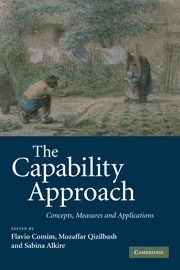Book contents
- Frontmatter
- Contents
- List of figures
- List of tables
- List of contributors
- List of acronyms
- Acknowledgements
- Introduction
- 1 Using the capability approach: prospective and evaluative analyses
- PART I Concepts
- 2 Amartya Sen's capability view: insightful sketch or distorted picture?
- 3 Sen's capability approach and feminist concerns
- 4 Beyond individual freedom and agency: structures of living together in the capability approach
- 5 Does identity matter? On the relevance of identity and interaction for capabilities
- 6 Measuring capabilities
- PART II Measures
- PART III Applications
- Index
- References
6 - Measuring capabilities
Published online by Cambridge University Press: 22 September 2009
- Frontmatter
- Contents
- List of figures
- List of tables
- List of contributors
- List of acronyms
- Acknowledgements
- Introduction
- 1 Using the capability approach: prospective and evaluative analyses
- PART I Concepts
- 2 Amartya Sen's capability view: insightful sketch or distorted picture?
- 3 Sen's capability approach and feminist concerns
- 4 Beyond individual freedom and agency: structures of living together in the capability approach
- 5 Does identity matter? On the relevance of identity and interaction for capabilities
- 6 Measuring capabilities
- PART II Measures
- PART III Applications
- Index
- References
Summary
Introduction
The measurement of capabilities is the most pressing challenge ahead for the operationalisation of the capability approach (CA). Yet the idea of measurement would seem prima facie inimical to the CA. Measurement in social sciences is usually identified with a narrowness of understanding about the application of concepts and theories. Quite often it involves dismissal of important qualitative information, such as what is important, good, or morally obligatory, focusing sometimes exclusively on quantitative information. In fact, in the jargon of the CA, we could say that measurement might entail a limitation of informational spaces used in evaluative assessments. Thus, in principle, it would seem that it is an error to insist on the measurement of capabilities. Whereas the CA puts forward a proposal for expansion of informational spaces for normative evaluations, assessment by measurement appears to narrow down those spaces, ignoring types of information that cannot be translated into concrete metrics. Sen (1999: 81) notes that the foundational merits of the CA do not
however, entail that the most fruitful focus of practical attention would invariably be measures of capabilities. Some capabilities are harder to measure than others, and attempts at putting them on a ‘metric’ may sometimes hide more than they reveal. [original emphasis]
Indeed, there are many different ways in which theories can be applied and, contrary to the conventional wisdom found, for instance, in mainstream economics, the operationalisation of a theory does not need to be limited to quantitative measurement.
- Type
- Chapter
- Information
- The Capability ApproachConcepts, Measures and Applications, pp. 157 - 200Publisher: Cambridge University PressPrint publication year: 2008
References
- 44
- Cited by

